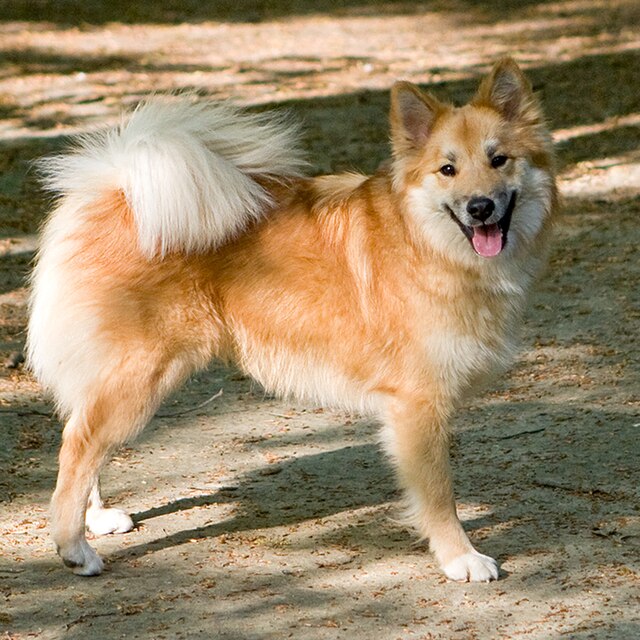


The Icelandic Sheepdog is a small to medium-sized breed known for its playful and energetic nature. This dog is an ancient working breed, originally developed in Iceland to herd sheep and other livestock in rugged terrain. Icelandic Sheepdogs are intelligent, loyal, and social dogs that thrive in active households. Their friendly and outgoing temperament makes them excellent family pets, and they are known for their strong bond with their owners. With their thick double coat and curled tail, they are well-adapted to cold climates.
The Icelandic Sheepdog is one of the oldest dog breeds, dating back over 1,000 years to the Viking Age. It is believed that Norse settlers brought the breed to Iceland, where the dogs were used to herd sheep, assist with livestock management, and protect flocks from predators. The Icelandic Sheepdog's adaptability to Iceland's harsh weather and rugged landscape made it an essential working dog for farmers. Despite the breed's long history, it faced a decline in numbers during the 20th century due to changes in farming practices and the introduction of other herding breeds. However, conservation efforts in recent decades have helped to stabilize the population of Icelandic Sheepdogs, and they remain a beloved national breed in Iceland.
The Icelandic Sheepdog is a medium-sized dog with a compact, athletic build. Males typically weigh between 30 to 35 pounds, while females are slightly smaller, usually between 25 to 30 pounds. They stand around 16 to 18 inches tall at the shoulder. The breed's coat is double-layered, consisting of a soft, dense undercoat and a longer, coarser outer coat. Icelandic Sheepdogs come in a variety of colors, including sable, black, tan, and white, and their coat can be either straight or slightly wavy. One of the breed's signature features is its curled tail, which is carried over the back. Their ears are triangular and erect, contributing to their alert and attentive expression.
The Icelandic Sheepdog is an affectionate and friendly breed, known for its gentle and playful nature. They are highly social and enjoy being part of the family. Icelandic Sheepdogs are good with children and can get along well with other pets, especially when properly socialized from a young age. While they are generally friendly with strangers, they may be reserved or cautious around unfamiliar people. This breed is intelligent, independent, and eager to please, but it can also be somewhat stubborn at times. Icelandic Sheepdogs are known for their vocal nature, often using barking as a way to communicate with their owners. They are also highly alert, making them good watchdogs.
The Icelandic Sheepdog is an active and energetic breed that requires regular physical and mental exercise to stay healthy and happy. As a herding dog, they enjoy activities that allow them to run, chase, and play. Daily walks, outdoor playtime, and interactive games such as fetch or agility training are great ways to keep them stimulated. Icelandic Sheepdogs have a strong instinct to herd, so they may attempt to herd other animals or even children if they aren't given enough physical outlets. Mental stimulation is equally important, and puzzle toys, obedience training, and problem-solving activities can help satisfy their intelligent and inquisitive nature.
Icelandic Sheepdogs are intelligent and eager to learn, making them relatively easy to train. However, they can sometimes be independent or stubborn, so consistent and positive reinforcement-based training is important. They respond well to praise, treats, and interactive play. Early socialization is crucial to ensure that they are well-behaved around other animals and people. This breed is generally good with children and other pets when properly socialized, but as a herding breed, they may try to herd smaller animals or children. Obedience training and clear boundaries are essential to ensure that their herding instincts don't turn into unwanted behaviors.
The Icelandic Sheepdog is a relatively healthy breed, but like all dogs, they are prone to certain health conditions. Common health issues include hip dysplasia, patellar luxation, and progressive retinal atrophy (PRA), a condition that affects vision. Regular veterinary checkups, a balanced diet, and proper exercise are essential to maintain their overall health. The breed's double coat requires regular grooming, especially during shedding seasons. Brushing a few times a week will help prevent mats and tangles, and regular baths will keep their coat clean. Additionally, routine ear cleaning and dental care should be part of their regular maintenance routine.
The Icelandic Sheepdog has an average lifespan of 12 to 15 years, which is typical for medium-sized breeds. With proper care, including regular veterinary visits, a healthy diet, and plenty of exercise, they can live a long and fulfilling life. Like all dogs, they can experience age-related issues such as arthritis or vision problems, so it's important for owners to monitor their health as they age and make adjustments to their care routine accordingly.
© copyright Dog Compendium 2024 - 2026